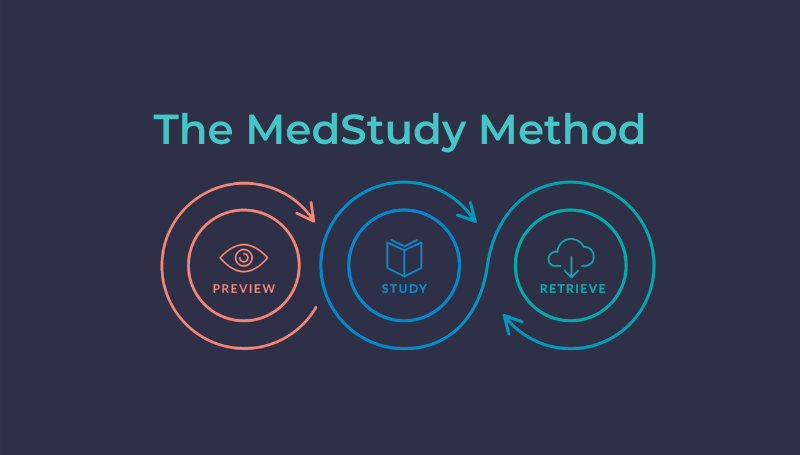
Cramming is not only exhausting, it does nothing to relieve the anxiety that you may not remember crucial information when you need it. That’s because cramming only works with short-term memory. The information you studied seems to evaporate in less time than it took to “learn” it.
So how do you study so that you not only remember important information, but can quickly retrieve it when you need it? There is a way! We’ve complied the best in evidence-based learning techniques to create the MedStudy Method, a 3-phase, cyclical approach proven to imbed information in your log-term memory, where it really counts.
The MedStudy Method
PHASE 1: ASSESS
Preview topics and assess your knowledge
Avoid “studying” during this phase. It’s more important to use this phase to determine what you know and don’t know. Previewing the information and becoming familiar with important points helps to make your mind “sticky” for additional information.
Ways to preview and assess:
- Use the Preview/Review tool in the Core
- Quiz yourself with Flashcards or Q&As
- Write out or record everything you know about a topic
PHASE 2: DIG DEEPER
Engage with the material to enhance understanding
Do not try to memorize. Get a good overview of the topic you are studying. Ponder a lot! Feel free to jot down notes or questions as you engage with the material, but don’t spend too much time at this point writing down information.
Ways to dig deeper:
- Read the Core Curriculum
- Attend a live or online course
- Watch a video board review
PHASE 3: SELF-TEST
Self-test to retain and access the information for the long term
Self-testing is essential if you want to make new information easily accessible both now and a year from now. During this phase, switch to easy modes of self-testing like Q&As or flashcards. Learn not only why a correct answer is right, but why an incorrect one is wrong. This allows you to self-correct for next time.
Ways to self-test and practice retrieval:
- Use Board-Style Q&A Premium
- Quiz yourself with Flashcards
REPEAT
Move back and forth and repeat these phases
This is a recursive process. Check on material in Phase 2 and self-test at lengthening intervals of time. Spaced repetition of these processes is critical. You must periodically exercise your recall of what you know for information to stick in your long-term memory. Though the MedStudy Method may at first seem harder than cramming, it creates long-term memory that will be easier to access when you need it in the future.
To learn more about self-testing and other important aspects of our method, download our FREE guide to the MedStudy Method.


